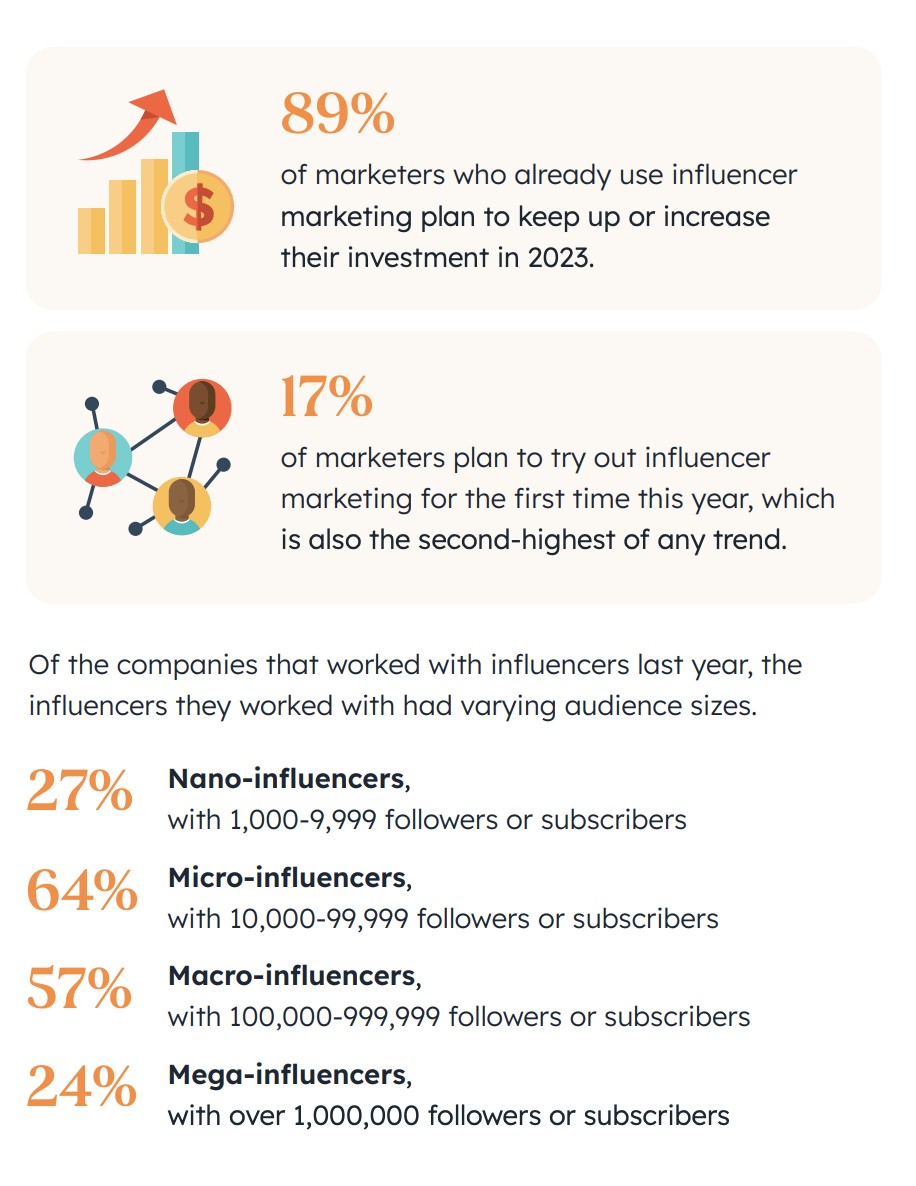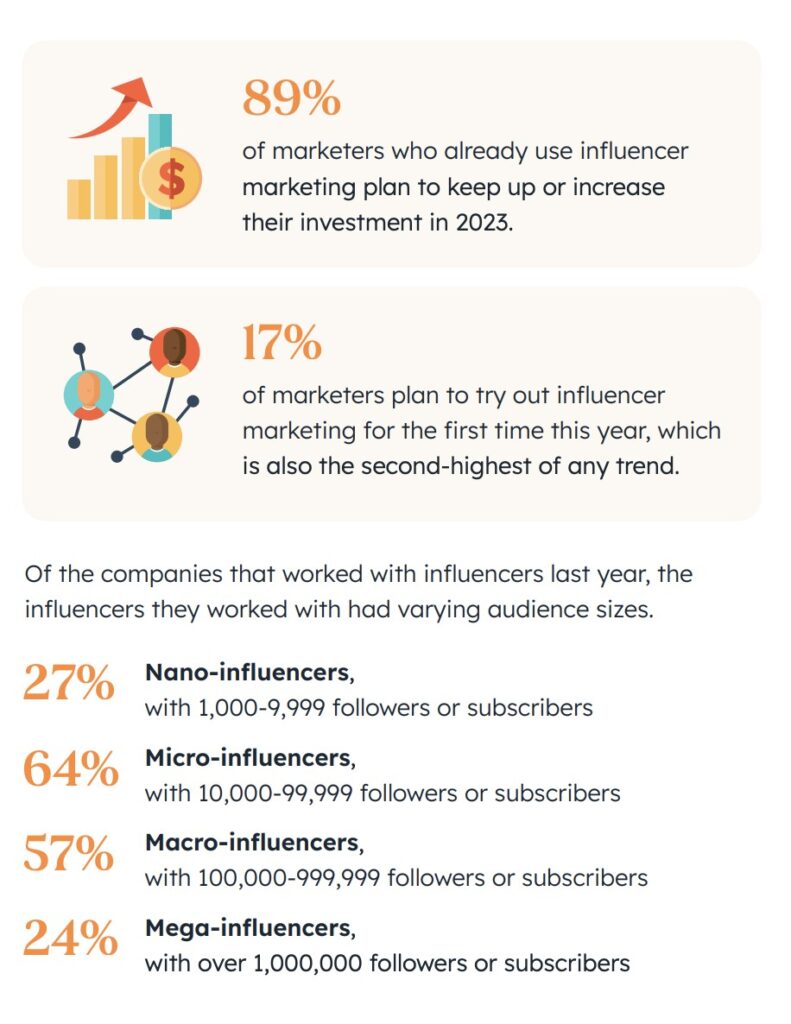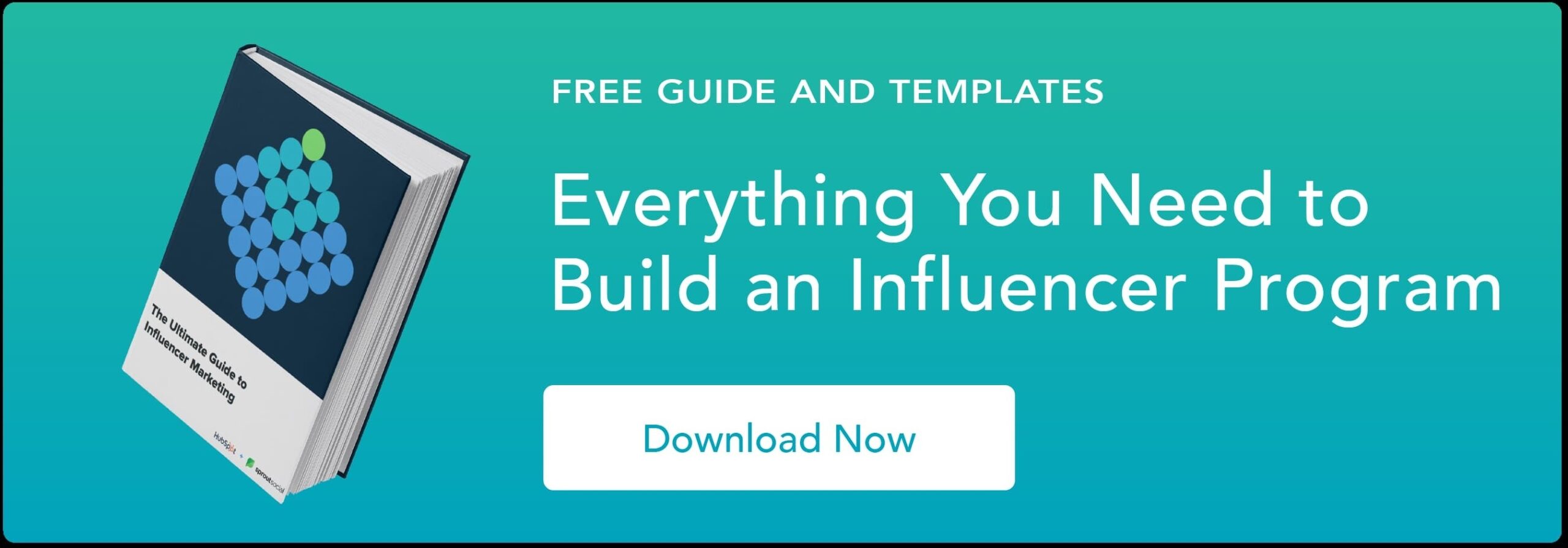I commented on a friend‘s vacation post, scrolled past a Comforter advertisement, and double-tapped an influencer’s skincare post this morning. That‘s the thing about brand influencer marketing — you follow them for a reason, so you don’t mind interacting with their sponsored content.
I follow this influencer because she‘s an editor of a major magazine that I enjoy reading, and her content interests me. Since I trust her opinion, I’ll check out any skincare brands she endorses.
Even though influencer marketing is a well-known marketing channel by now, it's always important to reiterate that your customers trust the opinions of others — and that majorly impacts buying decisions.
Nearly 90% of all marketers find ROI from influencer marketing comparable to, or better than, other marketing channels.
Now that we understand the potential benefits of leveraging influencers, let's consider strategies for identifying the most suitable ones for your industry.
What is an influencer?
An influencer is someone who‘s amassed a substantial social media audience and can sway their followers’ actions. So odds are you've seen them on many social media platforms, including Instagram, YouTube, TikTok, and Twitter.
Businesses can benefit from influencers by increasing brand awareness, reaching new audiences, and converting customers.
Collaborating with an influencer enables a business to use its credibility and influence its followers, resulting in higher sales and stronger customer loyalty.
Influencers can also create genuine content that resonates with their followers, helping businesses connect with their desired audience.
In 2022, 57% of marketers surveyed by HubSpot said their company worked with creators or influencers. Over one in four marketers currently leverage influencer marketing.
And 33% of Gen Zers have bought a product based on an influencer’s recommendation in the past three months.
However, it's vital to note that not all influencers and collaborations are equally advantageous. Choosing influencers based on their demographics, values, and content quality is essential so they align with your brand.
Ensure the partnership achieves the desired results by setting clear goals and expectations and tracking the campaign's performance.
The Benefits of Working With Brand Influencers
Do you want to work with brand influencers, or are you still on the fence? Brand influencer marketing is a recent development in online business, so you might not have much faith in its efficacy yet.
But that doesn’t mean brand influencer marketing isn’t practical. It’s one of the best ways to market your brand these days. If you aren’t convinced, here are a few benefits you can expect when working with a brand influencer.
Increased Brand Awareness
You could be the best in the world at what you do, but that doesn’t matter if nobody is aware. So how can you get more eyes on your brand, aside from the classic methods?
Brand influencer partnerships. Influencers are more prevalent than ever, and that can be to your advantage. Get more eyes on your business by tapping into a brand influencer’s audience.
Audience Growth
Successful influencers have large audiences — audiences they know well. After all, an influencer is nothing without an audience. Why not benefit from that connection?
A brand new audience can be intimidating but think of brand influencers as ambassadors. They lend their credibility to your business, meaning more loyal customers that you don’t have to work as hard to win over.
Increased Traffic
Could you use more leads? Of course, you could! A bigger audience is excellent, but it doesn’t necessarily mean more business for you. Once again, this is where brand influencer partnerships come into play.
For example, imagine an influencer mentioning and linking your product on their blog. Chances are, people will click through. And from there, there’s a better chance visitors will buy that product or check out the rest of your website.
More Sales
All actions in business lead to sales — at least, they should. Unfortunately, the truth is that nothing guarantees sales. The best you can do is increase your chances; influencers give you great odds.
Think about it: Most people buy things based on recommendations from individuals they trust — friends, celebrities, and of course, influencers.
So partnering with a brand influencer could help recommend your offer to a new audience, upping the number of people who become your customers.
How to Find Brand Influencers for Your Industry
How can you determine the right “fit” with a brand influencer? Business/influencer fit will become extremely important for your future collaborations, so be sure to nail down the following criteria:
1. Figure out your target audience.
A target audience varies by demographic, geographic, and behavioral factors, to name a few. Common ways to segment an audience are age, gender, location, behavior, lifestyle, values, and interests.
As you narrow your audience, you'll dive into the marketing strategies and content that resonate most with them.
Determining your target audience will ensure that your audience is similar to your influencers. Otherwise, your content will fall flat and won't inspire users to take action.
A great example of business/influencer fit is how many sportswear brands, like Nike and Puma, partner with famous athletes to create products and content.
If you're a fan of Lebron James, you probably already know Nike sponsors him — and that partnership goes a long way for Nike's business.
2. Research influencers.
There’s no doubt that social media is the best place to research your influencers — but let's break it down into more concrete steps.
The easiest way to find the right brand influencers is to see if any are already discussing your business.
Social monitoring or searching for your brand on social media sites are great ways to get started, and listening tools can help you find influencers already interested in your industry.
Another tip for researching influencers is to search for relevant hashtags.
If you're a health and wellness brand looking for an influencer, searching for “#health, #wellness, #sponsored, #ad” on Instagram will bring you to influencers who have already posted industry-relevant content.
If you see a post that catches your eye, check out the rest of the influencer's engagement on other posts.
Remember that influencers can have smaller, devoted followings — so don‘t turn away from someone just because they have fewer followers than you initially had in mind.
Additionally, there's a down arrow next book out for influencers who are alretitor’s brands.
If you see an influencer‘s post on Instagram that may resonate with your brand, try looking for similar profiles. Next to the "Follow" button on Instagram, there’s a down arrow.
You'll see a list of suggested users by clicking the down arrow. Scroll through those and see if anyone is willing to take you on.
3. Determine relevance.
Take a look at your content. What is your brand‘s aesthetic, and what tone do you use in your copy? What are the underlying messages you’re trying to communicate?
It‘s essential to see how aligned your influencer’s content is with your own. Their social presence shouldn't be filled with posts like yours, but their messaging should be similar since you’re targeting a specific audience.
Engagement is also an indicator of relevance for your brand. If the influencer‘s audience isn’t engaged with their content, partnering with your brand won‘t make a difference.
Determining whether the influencer's followers are commenting and sharing their content or just liking it is essential.
Additionally, do similar users return to comment and like content time and time again? This implies that the influencer's audience enjoys engaging with the influencer and likes the content she promotes.
Connecting with Influencers
Now that you‘ve done your initial research and hopefully conducted a list of possible influencers for your brand to work with, it’s time to connect.
You want to reach out to influencers without seeming spammy or too transactional. Relationships are key, after all.
And if you have a terrible relationship with your brand influencer, odds are they won't continue to post on your behalf.
1. Reach out...strategically.
There are better strategies than cold emailing or direct messaging an influencer for relationship building. If you want to work with an influencer, try courting them first.
I mean that you should subscribe to their blog, follow all their social channels, and comment on their posts. Influencers work hard on their content, just like your business does.
If you want an influencer to take notice of your business, you have to be interested in what they're doing. Beginning a partnership by interacting on the channels you hope to work together on will demonstrate your interest.
Influencers work hard on their content, just like your business does. If you want an influencer to take notice of your business, you have to be interested in what they're doing.
Beginning a partnership by interacting on the channels you hope to work together on will demonstrate your interest.
Some influencers have a presence on multiple social media platforms. It‘s your job to know how they want to be contacted for business partnerships. If they have a business email in their Instagram bio, that’s likely the best choice.
Alternatively, maybe they have an inquiries section on their blog. Whatever the case is, make sure to send a personal message that doesn‘t feel like it’s been generated by a template.
2. Make a human connection.
Sending messages into the digital universe is scary because you don‘t know when or if you’ll ever hear back. Making a connection in the real world is much more actionable and gives a face to your business.
This doesn‘t mean you should go out and stalk your list of influencers until you meet in person. If you’re serious about connecting, try attending or hosting an influencer event.
Bringing influencers to you will make connecting with them much more accessible and allow them to interact with your brand before agreeing to work with you.
Many marketers are learning to market themselves as well as their businesses. Hopefully, you've also been growing your network — so you may already have connections to your influencers.
If you have someone at the top of your list, see if they‘re following someone you know. Maybe they’ve worked with a similar brand, and you know someone on that team.
The world is smaller than we think, and you might be sitting on a goldmine of potential relationships.
3. Manage your outreach efforts.
Like any other marketing strategy, influencer outreach should be organized and well-documented. The last thing you want is to accidentally reach out to the same influencer on four platforms with the same message. Yikes.
After reaching out, give an influencer some time before a follow-up. Like in a sales pitch, you don‘t want to be overbearing or clingy. Respect the influencer’s time — if they want to work with you, they'll respond to your outreach.
You should also be documenting what outreach strategies work for you. Maybe after a first email, you've succeeded in hopping on a call with potential influencers.
Knowing what works for you will help you further develop your outreach strategy and enable you to be more creative.
Best Practices for Working With Brand Influencers
A new form of marketing, like influencer partnerships, can seem discouraging. You might not know the best way to do it if you haven't worked with many influencers yet. In that case, review some of these most promising practices.
Here, you can get a sounder idea of what to anticipate when you pursue your next brand influencer partnership.
Be Goal-Oriented
Before anything, make sure your business is in order. A brand influencer partnership is doomed to fail if either party isn’t pulling their weight, so ensure you’re on the same page.
Most importantly, establish and communicate your goals. Do you want more sales? More email subscriptions? Instagram followers? Get as explicit as possible and let influencers know when you reach out.
Focus on Relevance
Bigger isn’t always better when it comes to brand influencers. The assumption that more followers translate to greater brand exposure may not always hold.
Instead of popularity, you should prioritize relevance in your search for a brand influencer. This ensures a better match between your brand and the brand influencer.
This overlap makes you more likely to secure a partnership with a receptive audience.
Diversify
Let’s think of brand influencer partnerships as investments for a minute. They won’t always return what you invest, so risks are always involved. What steps should you take under those circumstances? Diversify.
Or, at least, don’t go all-in on one influencer partnership. The other extreme is collaborating with many influencers to increase your chances of a winning coalition.
You can see what’s best for your brand, but a middle-of-the-road approach works best for most.
Trust Them
No one likes being told what to do. Influencers are no different, so don’t forget that when you collaborate. After all, if you had their influence, you wouldn’t need to partner with influencers.
That doesn’t mean they should have free reign, however.
Make sure you’re on the same page regarding standards like deadlines. Other than that, do your research before you partner with any influencers. It takes both parties to form a successful partnership, so mutual trust goes a long way.
How to Become a Brand Influencer
You have learned about partnering with influencers, but what if you aspire to become one? There isn't necessarily a prescribed method, but here are a few advised steps to consider.
1. Get in your niche.
What sparks your interest or ignites your passion? Becoming an influencer in any industry is possible, but choosing the sector where you possess a strong understanding and proficiency is essential.
2. Get to know your audience.
There are various methods to initiate the process, but an initial step could be to analyze your social media metrics. This should give you an idea of your demographics and who’s consuming your content.
3. Post content.
You can post on the fly or develop a content strategy. We recommend a content strategy, but that might not be necessary as you start. Ensure you release relevant content consistently, even if you don’t stick to a schedule.
4. Stay consistent.
The previous three steps are the fundamentals of becoming a brand influencer, but they’re also just the start. Keep up the hard work, and be consistent. An online reputation is hard to build and easy to destroy.
Reach New Audiences With a Brand Influencer
Brand influencers can help you build and expand a devoted following, increase your word-of-mouth marketing efforts, increase sales, leads, and conversions, and create more human relationships with your potential customers.
The right influencers are inherently interested in your brand, believe in your mission, and can communicate about your business eloquently.
Focusing on long-term relationships with your influencers will continue building their knowledge of your company and bring the best results.


